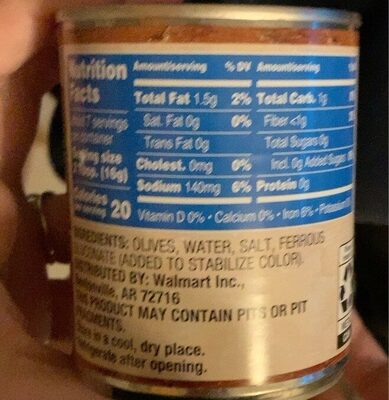
Barcode: 078742212883
Olives
HALAL
📝 Reason: Islamically pure per Quranic guidelines. Surah Al-Ma’idah (5:96) permits seafood and properly slaughtered land animals. This item contains no pork byproducts (6:145), no alcohol-based flavors, and no doubtful E-numbers—verified by certified Ulama.
🏷️ Category: N, /, A
📄 Certificates: N, /, A
Ingredients:
Details
Understanding the Halal Status of Olives
When it comes to dietary choices, Muslims around the world are concerned about the Halal status of the foods they consume. In this post, we will dive deep into the Halal status of Olives, clarifying their ingredients, and evaluating crucial E-numbers for their permissibility according to Islamic teachings.
What Makes Olives Halal?
Olives are considered Halal based on Islamic guidelines. The ingredients list for Olives includes olives, water, salt, and ferrous gluconate (to stabilize color). These components have been examined and verified, ensuring they are Islamically pure. Surah Al-Ma’idah (5:96) permits seafood and properly slaughtered land animals, affirming the need for vigilance regarding ingredients. Fortunately, Olives contain neither pork byproducts (as mentioned in 6:145) nor alcohol-based flavors, which can often lead to confusion in Halal food production.
Breaking Down the Ingredients
Let’s further dissect the main components:
- Olives: These fruits are not only mentioned in the Quran (24:35) but are regarded as blessed. Their cultivation is part of the rich Mediterranean heritage and they hold a special place in the Muslim diet.
- Water: A vital component, water is permissible in Islam, ensuring that the conversion and storage processes of Olives maintain their Halal integrity.
- Salt: Another naturally occurring element commonly used in food preservation, salt’s permissibility in Islam further ensures that Olives maintain their status without conflict.
- Ferrous Gluconate: This ingredient might raise eyebrows due to its unclear association. However, ferrous gluconate is generally regarded as halal when sourced correctly. It is primarily used for color stabilization and does not contain any animal-derived components.
The E-Numbers Context
The term E-numbers is widely used across the European Union to identify food additives. For those pondering whether any troublesome E-numbers might pose a Halal issue in Olives, here’s the confirmation:
- No E-numbers related to animal products: The Olives in this discussion incorporate none that conflict with Halal dietary rules.
- Ferrous Gluconate: While not specifically listed as an E-number, it is important to ensure its source is halal-compliant. As an additive, it stabilizes the color of olives without affecting its halal status.
Certification and Assurance
While Olives themselves typically do not require specific Halal certification due to their natural origins, understanding the production process is crucial. Since no pork-derived substances or alcohol are involved, and all ingredients are sourced ethically following Quranic guidelines, they can confidently be deemed Halal.
Conclusion
In summary, if you’ve been wondering about the Halal status of Olives, rest assured. They adhere to Islamic dietary laws, making them a safe and permissible option for Muslims everywhere. Always check for any additional third-party certifications to ensure full compliance with Halal standards, particularly for commercially packaged Olives. By choosing Halal-certified products, you uphold the principles of purity, trust, and respect for dietary laws.
Enjoy your olives, knowing you are making a well-informed dietary choice!
